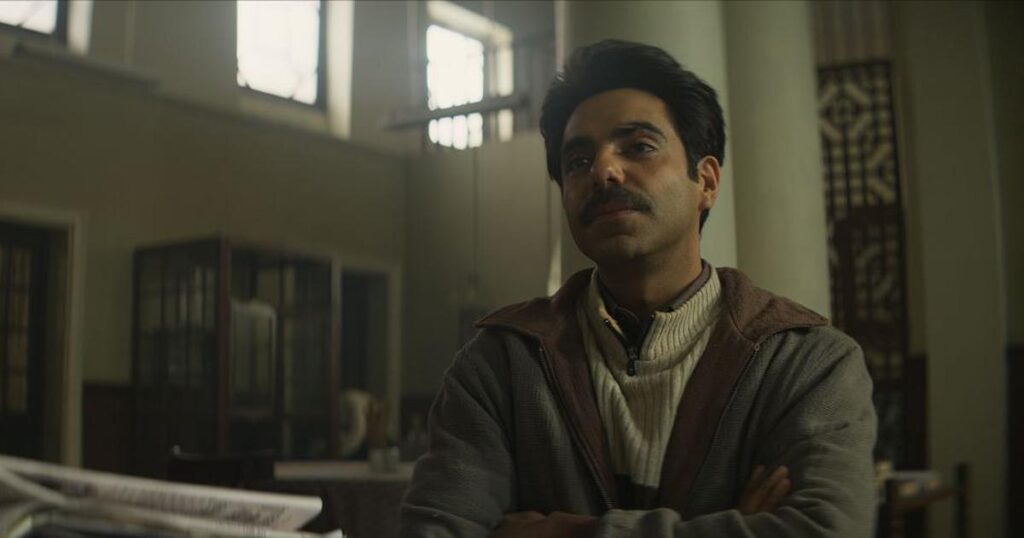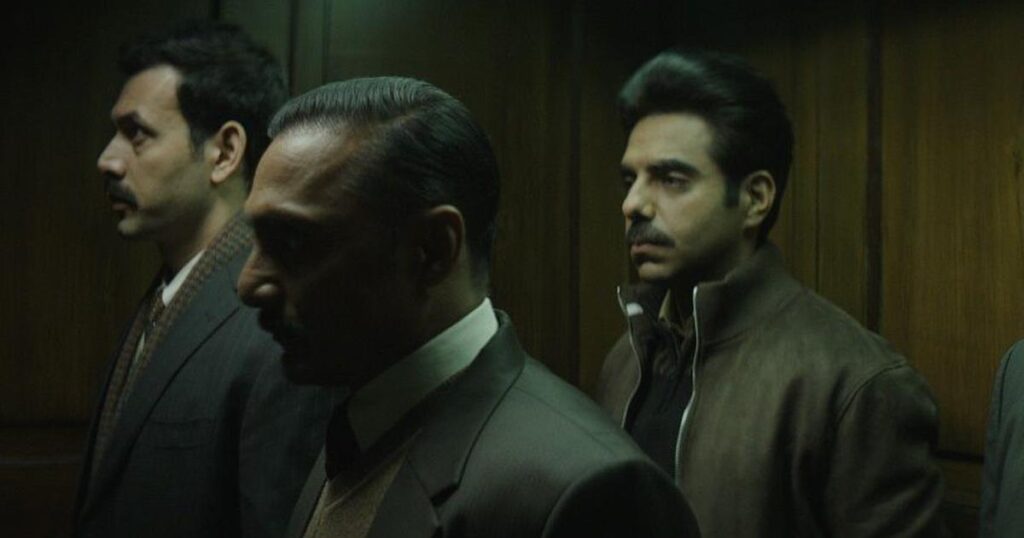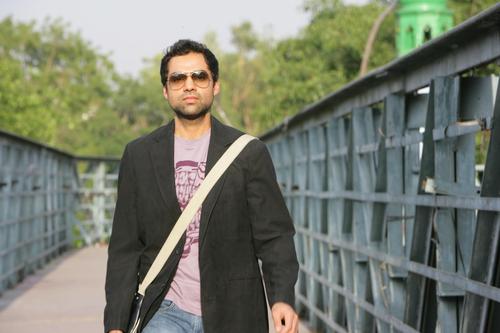Atul Sabharwal‘s third feature film, Berlin, is an espionage thriller set during the times when India, under the leadership of Prime Minister P.V. Narasimha Rao, was striving to establish a strong geopolitical relation with Russia. The Cold War had just been over, and it was time for new economic growth for the nation. With that changed scenario, the modus operandi of the intelligence departments also changed. The film is forthrightly cerebral and minimalist, and offers a stark and sharp presentation of mystery and tension. The tale largely unfolds in claustrophobic locations where civilians are at pains to constantly wonder. This proves to heighten the mood of the spy game, as it throws the viewer into the deceptive rituals of bureaucratic politics, where intelligence agencies walk a delicate tightrope between managing failures, honeytraps, and denial.
It is 1993, and winter has Delhi City in a cold grip. Pushkin is an expert in sign language and teaches at a school for differently-abled children. Suddenly, one day he is officially assigned to interpreting duties during the interrogation of Ashok (Ishwak Singh), a deaf-mute young man who the Bureau’s intelligence officer Sondhi suspects is a spy. Though reluctant, Pushkin embarks on the operation. As Pushkin begins his work, he is abducted by a rival intelligence agency known as Wing, which is at odds with the Bureau. Raman, an agent from Wing, pressures Pushkin to manipulate the interpretation, threatening the safety of his family. The next day as the interrogation continues, Pushkin’s behaviors make Sodhi suspicious that the interpreter has been compromised. Pushkin becomes aware of a café called Berlin, where the classified government information floats very casually between the operatives of an intelligence agency. Ashok worked as a waiter in the cafe. The Russian president is supposed to visit India shortly, and a plot to assassinate him is already in motion. A mysterious woman who was identified as part of the conspiracy has disappeared, and finding her will stop the mayhem from happening. Now, Pushkin is entangled in a web of secrets and lies, illusions and grim truths, loyalty and betrayal.

The brilliance of Berlin lies in creating an atmosphere of dread and suspense through a measuredly paced narrative that brings the plausibility of a fictional world that is palpable. What the film does exceptionally well is immerse us in the lonely and isolated world the characters are forced to inhabit. It effectively establishes a pervasive sense of paranoia that characterized the milieu. It allows the viewers to feel the tension and uncertainty that defined their lives. The exchange of sign language between Pushkin and Ashok carries an emotional connection that is nuanced and subtly shaded. As Pushkin becomes Ashok’s voice to the Bureau, a seemingly bond seems to form between them, which complicates Pushkin’s role as an interpreter and blurs the lines between responsibility and empathy. There are moments when Ashok, out of the blue, asks Pushkin who named him after the Russian poet and whether he ever feels lonely. Such inquisitiveness not only humanizes Ashok but also unsettles Pushkin, making him reflect on his own life, isolation, and the moral weight of the situation he’s caught in. This growing connection further complicates Pushkin’s ability to remain objective as the emotional stakes rise with each passing conversation. The brutalist structures of the government offices and the claustrophobic space of the interrogation room bring a stark, oppressive atmosphere to the proceedings. The old, unyielding architecture mirrors the rigidity of the bureaucratic system. The confined setting heightens the psychological tension. Pushkin and Ashok are trapped in a space dominated by power dynamics, gazes, and manipulation.
Despite a strong build-up, the film falters midway, struggling to keep us engaged with the progression of the story in a compelling manner. The plot presents a chain of seemingly complex events that eventually detracts our engagement in the film. The interrogation scenes drag on, consuming much of the screen time without advancing the story captivatingly to finally reach the conclusion. It feels as though Sabarwal, who is also the writer, is merely going through the motions, with the acts being a bit too repetitive to leave a lasting impression. The film would benefit from being about thirty minutes shorter. The character of the missing woman, who is crucial to unraveling the central mystery, is treated like a filler lacking depth or clear motives. Ashok’s sudden ability to locate a Wing member’s address and skillfully use a gun feels far-fetched and unconvincing. Pushkin’s premarital meeting with a girl, where her father (played by Joy Sengupta) is present, is shoehorned into the story to highlight the benefits of liberalization in India, contrasting multinational companies’ high salaries with government jobs. The film’s climax fails to deliver a satisfying twist or revelation, leaving the conclusion feeling flimsy and unimpactful.

The cinematography by Shreedutta Namjoshi effectively captures the period of the film, highlighting delicate nuances of light and shadow, resulting in a visually striking presentation that complements the film’s minimalist setting. Whether it’s the claustrophobic atmosphere of the interrogation room, the wide expanse of the café, or the secluded exterior locations, the camera maintains a constant sense of motion, a consistently subjective point of view, and features meticulously crafted sequences that are carefully executed. Irene Dhar Malik’s editing sustains the film’s tempo, providing an absorbing pace that allows us to linger on moments while intensifying the rhythm where necessary. Her skillful shifts in perspective bring an edginess giving the film a more dynamic and engaging feel than the script could provide. The production design by Ashok Lokare and Sandeep Shelar effectively recreates the architecture, landscape, and interiors with meticulous attention to detail. Elements like the National Panasonic cassette recorder, Contessa and Fiat cars, and voice recording machines authentically evoke the 1990s and become integral characters in the film. The sound design by Anthony Ruban brings a sharp balance between nuances and dialogues, evoking a vision of a suspicious world filled with deception. The shrill sound of the telephone punctuates the atmosphere, heightening the tension and reflecting the anxiety of the characters as they navigate their uncertain reality. The background score by K. Krishna Kumar effectively conveys a sense of sombreness and trepidation, enhancing the film’s emotional impact.
Aparshakti Khurana delivers a controlled and sincere performance as Pushkin Verma, the interpreter who grapples with his conscience to discern the guilt or innocence of others. However, his noble efforts sometimes feel stilted and fall short of perfection. Ishwak Singh portrays Ashok with a sensitive depiction of a deaf-mute individual, conveying intelligence and emotion without uttering a single word, demonstrating that his disability does not overshadow his capabilities. Rahul Bose plays the manipulative and dominating Jagdish Sondhi effectively, but given his stature, he could deliver a more nuanced performance. Deepak Kejriwal’s portrayal of the Wing agent Raman lacks conviction, and Anupriya Goenka, in her brief role, is not fully utilized. The supporting cast, including Nitesh Pandey, Ujjwal Chopra, Kabir Bedi, and Jigar Mehta, performs well in their respective roles.
In conclusion, despite the filmmaker’s intentions to create a rich and thought-provoking narrative, Berlin ultimately falls short of its aspirations. The intricate layers and complex themes intended to engage the viewers instead lead to a slow and underwhelming experience.






